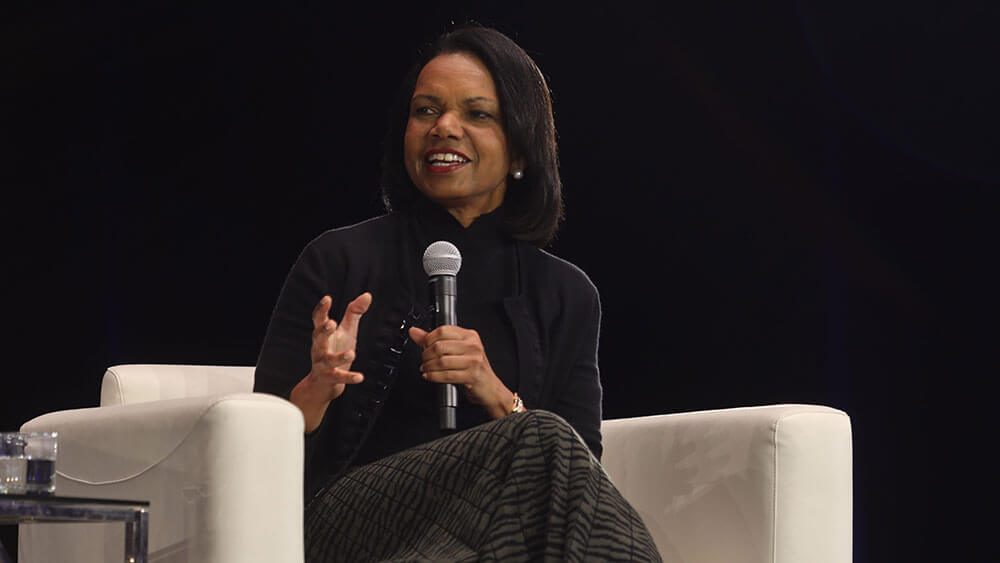
Condoleezza Rice, the 66th Secretary of State, closes the Main Stage program at PCMA Convening Leaders 2020 at San Francisco’s Moscone Center. (Jacob Slaton Photography)
Throughout a career that has taken her to the highest reaches of power, former U.S. Secretary of State Condoleezza Rice drew on the values of faith, family, and education that she learned as she was growing up in racially segregated Birmingham, Alabama, she told the audience during the closing keynote at PCMA Convening Leaders 2020 in San Francisco. Her parents were determined, Rice said, that “I might not be able to have a hamburger at Woolworth’s lunch counter, but I could be president of the United States if I wanted to be.”
Rice was candid, and often funny, as she talked for nearly an hour with Convening Leaders moderator Holly Ransom, reflecting on what she has learned over the course of her career about leadership and meeting difficult challenges. Rice served as secretary of state in the George W. Bush administration from 2005 to 2009, and as Bush’s national security adviser from 2001 to 2005. She currently teaches at Stanford University, as the Denning Professor in Global Business and Economy at the Stanford Graduate School of Business and the Thomas and Barbara Stephenson Senior Fellow on Public Policy at the Hoover Institution.
Her initial plan was to be a concert pianist, but she turned to a career in international politics, she said, when she realized her ability as a pianist would never take her very far. She credits much of her success to her mentors, who, at the time were all “old, white men.” Mentors don’t have to look like you, Rice said. “Look for mentors who are people who are going to believe in you and see things that you don’t see in yourself.”
She was secretary of state during the 9/11 terrorist attacks, which Rice called “arguably the hardest moment in the last generation.” From Bush, she learned “how to be strong and resolute in the hardest of times,” and also how to move forward when the stakes are high and the path is unclear, she said. “How do you deal with something when you truly have no reference point for how to make decisions?” she asked. Ultimately, “you have to keep your wits about you, you have to trust your instincts and your gut, and those around you. You have to make the decisions, because not making a decision is making a decision.”
She gained other lessons from President George H.W. Bush, for whom Rice worked as the National Security Council’s Soviet and Eastern Europe affairs advisor at the end of the Cold War. The senior Bush “had a kind of humility that is sometimes lacking in presidents,” Rice said. When the Berlin Wall fell in 1989, Bush’s aides urged him to fly to Germany to celebrate, but Bush demurred, saying “this is a German moment, not an American moment,” Rice recalled. “He knew the great art of letting somebody else be the center of attention. Many times, the greatest leaders are the ones that can nurture leadership of others.”
It’s not in her DNA to run for public office, Rice said in response to Ransom’s question about whether or not that was a possibility in the future. Besides, “Americans are kind of ungovernable,” Rice said. Her plan is to teach the next generation of leaders, whom she called the most high-minded that she has encountered. “They want to do something bigger than themselves — but they are in a hurry.”
Rice sits in the middle of Silicon Valley, and some of the biggest challenges that we face are in using technology wisely — technology is neither good nor bad, but neutral, Rice said. “It’s how it’s applied that makes it good.” Rice also stressed the importance of improving public education and ensuring access to opportunity to everyone. “In the U.S., we share a common creed that belonged to everybody, including immigrants and those on the lowest rungs who want to move up,” she said. “But when I can look at your ZIP code and tell you whether you have access to a good education or not, that’s no longer true.”
Rice’s experience has given her perspective on the difficulties the nation faces today, she said. “I know it is a tough time, but we have been through tougher,” she said. As secretary of state, she swore to uphold a Constitution that once counted her ancestors as three-fifths of a man, she said. As she was standing in front of a portrait of Ben Franklin, being given the oath of office by a Jewish woman, Supreme Court Justice Ruth Bader Ginsburg, “I had to think about what that meant.”
“You can get through difficult times, but it doesn’t happen magically,” she said. Rice said she doesn’t look to Washington or state government to take responsibility, but asks herself daily: “What am I doing to take responsibility? Because democracy is only as strong as its weakest link.”
Barbara Palmer is deputy editor at Convene.

